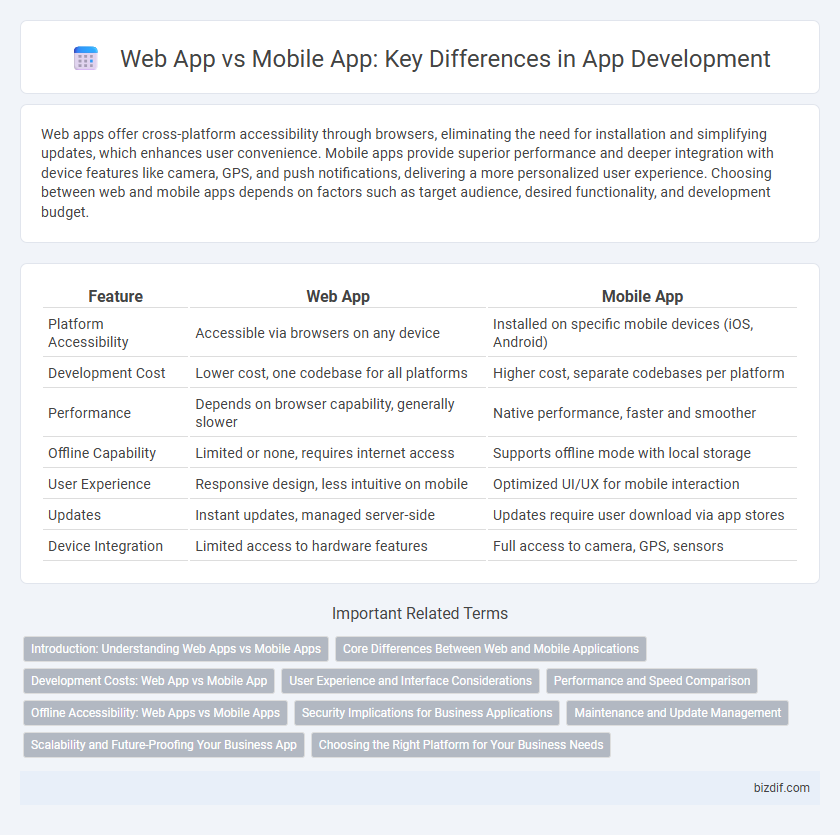Web apps offer cross-platform accessibility through browsers, eliminating the need for installation and simplifying updates, which enhances user convenience. Mobile apps provide superior performance and deeper integration with device features like camera, GPS, and push notifications, delivering a more personalized user experience. Choosing between web and mobile apps depends on factors such as target audience, desired functionality, and development budget.
Table of Comparison
| Feature | Web App | Mobile App |
|---|---|---|
| Platform Accessibility | Accessible via browsers on any device | Installed on specific mobile devices (iOS, Android) |
| Development Cost | Lower cost, one codebase for all platforms | Higher cost, separate codebases per platform |
| Performance | Depends on browser capability, generally slower | Native performance, faster and smoother |
| Offline Capability | Limited or none, requires internet access | Supports offline mode with local storage |
| User Experience | Responsive design, less intuitive on mobile | Optimized UI/UX for mobile interaction |
| Updates | Instant updates, managed server-side | Updates require user download via app stores |
| Device Integration | Limited access to hardware features | Full access to camera, GPS, sensors |
Introduction: Understanding Web Apps vs Mobile Apps
Web apps run in browsers and offer cross-platform compatibility without installation, relying on internet connectivity for access. Mobile apps are native to specific operating systems like iOS or Android, delivering optimized performance, offline functionality, and deeper integration with device hardware. Choosing between a web app and a mobile app depends on factors such as user experience, performance needs, development costs, and target audience behavior.
Core Differences Between Web and Mobile Applications
Web apps run directly in browsers and require an internet connection, offering cross-platform compatibility without installation. Mobile apps are installed on devices, providing faster performance and better access to device-specific features like GPS and cameras. Development for mobile apps demands platform-specific coding, while web apps utilize standard web technologies such as HTML, CSS, and JavaScript for broader reach.
Development Costs: Web App vs Mobile App
Development costs for web apps are generally lower than mobile apps due to a single codebase compatible across multiple browsers and platforms, reducing the need for separate versions. Mobile app development requires creating distinct versions for iOS and Android, increasing complexity, time, and expenses. Maintenance costs also tend to be higher for mobile apps because of frequent updates, app store approvals, and device-specific optimizations.
User Experience and Interface Considerations
Web apps offer greater accessibility across devices through responsive design, but mobile apps provide smoother, faster performance tailored to specific operating systems. Mobile apps can leverage device features like GPS, camera, and push notifications to enhance user engagement, while web apps rely on browser capabilities that may limit interface responsiveness. Designing for mobile apps allows deeper customization of user interface elements, resulting in a more intuitive and cohesive user experience compared to the relatively uniform layouts of web apps.
Performance and Speed Comparison
Web apps offer broad accessibility via browsers but often face latency issues impacting speed, especially with complex interactions or heavy data loads. Mobile apps leverage device-specific optimizations and local processing, delivering faster performance, smoother animations, and offline capabilities. Performance benchmarks consistently show mobile apps outperform web apps in load times and responsiveness due to direct hardware access and optimized resource management.
Offline Accessibility: Web Apps vs Mobile Apps
Mobile apps offer superior offline accessibility by storing data and functionality directly on devices, enabling uninterrupted use without internet connectivity. Web apps largely depend on internet access but can incorporate limited offline capabilities using service workers and caching technologies. Offline performance is therefore more robust and reliable in mobile apps compared to web apps, which remain constrained by browser and network limitations.
Security Implications for Business Applications
Web apps typically face higher security risks due to their exposure to various web-based attacks like cross-site scripting (XSS) and SQL injection, necessitating robust server-side security measures for business applications. Mobile apps benefit from operating system-level security features, such as sandboxing and biometric authentication, but require careful management of permissions and secure data storage to prevent unauthorized access. Implementing strong encryption and regular security updates is critical for both platforms to protect sensitive business data and maintain user trust.
Maintenance and Update Management
Mobile app maintenance often requires separate updates for different operating systems like iOS and Android, increasing complexity and cost, while web apps allow centralized updates deployed instantly across all users through browsers. Web apps benefit from continuous delivery models, reducing downtime and enabling faster bug fixes compared to mobile apps that rely on user-initiated downloads from app stores. Managing updates for mobile apps involves strict compliance with app store policies, which can delay rollouts, whereas web apps provide more flexibility and control for developers in maintenance workflows.
Scalability and Future-Proofing Your Business App
Web apps offer superior scalability by running seamlessly on multiple devices and platforms through browsers, reducing development time and costs for updates and feature rollouts. Mobile apps provide enhanced performance and offline capabilities but require separate development for each operating system, potentially complicating future scalability and maintenance. Prioritizing web app frameworks with responsive design and progressive web app (PWA) features ensures long-term adaptability as technology and user preferences evolve.
Choosing the Right Platform for Your Business Needs
Selecting the right platform between web apps and mobile apps depends on your business goals, target audience, and budget constraints. Web apps offer cross-platform compatibility and easier maintenance, making them ideal for wide accessibility and frequent updates. Mobile apps provide superior performance, offline access, and enhanced user engagement tailored to specific operating systems, benefiting businesses focused on delivering a rich, device-optimized experience.
Web App vs Mobile App Infographic

 bizdif.com
bizdif.com